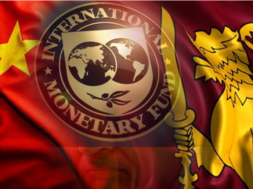
China: IMF predicts 4.6% growth in 2024 and 4% in 2025; calls for data transparency
Virendra Pandit
New Delhi: The International Monetary Fund (IMF) has projected a 4.6 percent growth in China’s economy this year and 4 percent in 2025, even as it called for greater transparency in financial and economic data availability, underlined by a six-month suspension of official youth unemployment data.
Uncertainty surrounding China’s economy remains high this year, dragged down by the ongoing property market slump, the IMF said on Friday, as it urged Beijing to address gaps in its economic and financial data, the media reported.
The IMF expects China’s gross domestic product (GDP) to grow by 4.6 percent this year, before slowing to 4 percent in 2025, because of the ongoing property sector meltdown, which would further dampen private demand and confidence, and add to local government budget strains.
“Uncertainty surrounding the outlook is high, particularly given the existing large imbalances and associated vulnerabilities,” the global lender said.
“Staff estimate that, in such an adverse scenario which entails a deeper and more prolonged contraction in the property sector, GDP in 2025 could be 1.8 percent lower compared to the baseline (of 4 percent).”
Last year, China’s economy grew by a higher-than-expected 5.2 percent, and Beijing is again likely to set a GDP growth target of around 5 percent for 2024.
China’s recovery from the COVID-19 pandemic has been patchy, weighed down by a prolonged real estate market downturn, a local government debt crisis, weak demand, and heightened geopolitical tensions.
The IMF said any more shocks to growth and earnings amid high debt levels in the property sector and within some local governments could bring about broader balance sheet stress and weaker lending capacity, including at smaller local financial institutions.
The Washington-based global lender brought up data transparency issues with the Chinese authorities during its visit last year, including the suspension of its youth unemployment data.
The National Bureau of Statistics (NBS) has since revamped the jobless figures for the 16 to 24 age group, resuming its release in January 2024 after a six-month suspension.
The IMF also highlighted “significant” gaps in quarterly GDP data, general government figures, and details on off-budget entities including local government financing vehicles, which are used by local authorities to borrow money off the balance sheets.
The IMF also spotted discrepancies among official sources in the balance of payment and customs trade data.
“Greater transparency” is needed concerning China’s foreign exchange interventions and in its recording methods for public sector foreign assets to “help explain the widening divergence between changes in official foreign assets and accumulated changes in foreign reserves recorded in the balance of payments”, the IMF added.
In recent years, China’s foreign exchange reserve growth on the balance sheet of the People’s Bank of China was found to have diverged from reported foreign exchange reserves included in its balance of payments data.
Trade surplus data from China’s customs authority also deviated significantly from the balance of payments figures, which track the same data.
However, IMF’s Executive Director for China Zhang Zhengxin defended Beijing’s measures to support its beleaguered property sector, saying the lender’s forecast on the real estate market was, to some extent, “too pessimistic.”
China “has always fully complied with our agreements and commitments to the IMF on data disclosure and provision”, Zhang added.
The IMF has warned the rising use of subsidies by some of the world’s largest economies has contributed to a significant increase in global trade tensions.
Industrial policy measures, including domestic subsidies and trade restrictions, are becoming more frequent among G20 economies
In the review, the IMF said that China’s state intervention and use of industrial policies to develop home-grown technologies and enhance self-reliance may contribute to excess capacity in targeted sectors, distort resource allocation, and create an uneven playing field among private enterprises.













